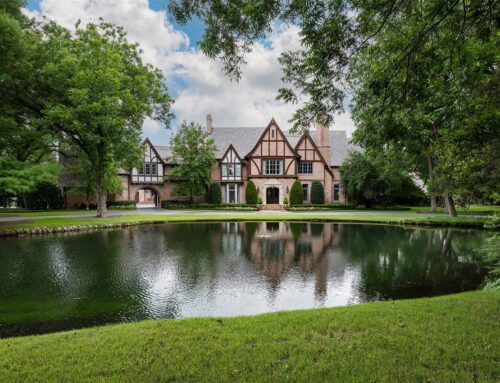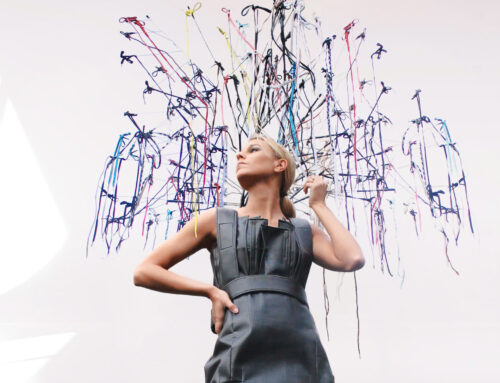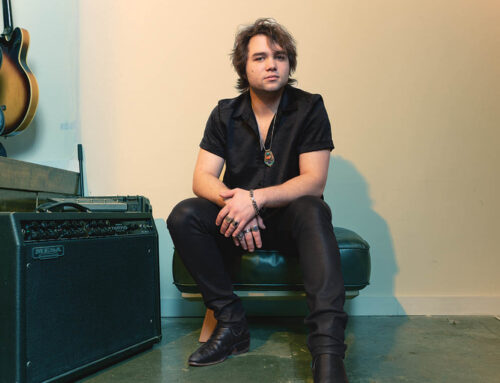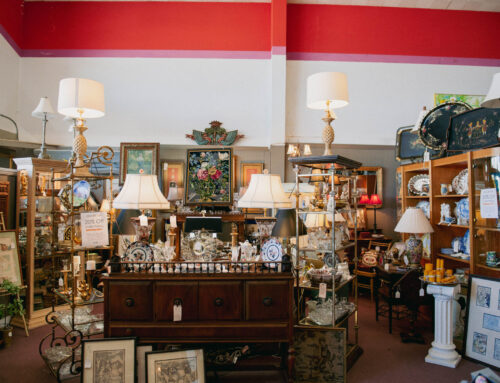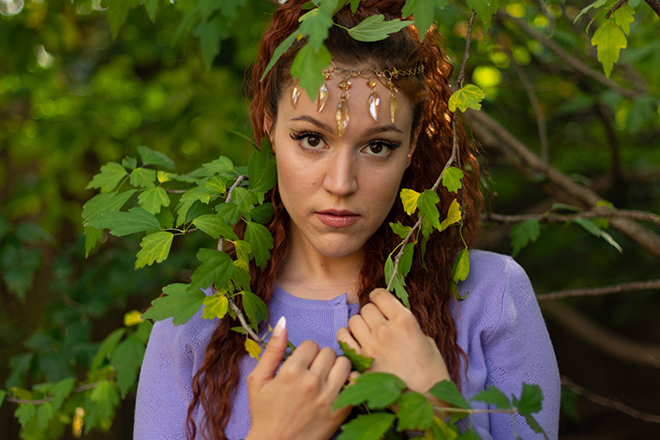
Photography by Carly May
W hen then-14-year-old Olivia Kuper Harris wrote her first song, “Lonestar Heart,” she was sitting on the roof of the two-story Glencoe Street house where she was born. She grew up in a self-described “hippie-Jewish” family with music as a focal point. Her parents were contra dancers, a folk dance with roots in English, Scottish and French styles. Classical and folk music rang through the Kuper Harris home, but she found her passion in jazz, R&B, soul and a touch of country. She’s grateful she grew up with access to Dallas’ music scene, including attending Booker T. Washington High School for the Performing and Visual Arts. Kuper Harris has done enough acting to receive an IMDb mention for her work in “The Playroom,” prompting a New York Times critic to remark: “The real star, though, is a newcomer named Olivia Harris. Ms. Harris is also quite a singer. Over the closing credits, she delivers the eeriest, loveliest version of ‘Up on the Roof’ you’re ever likely to hear.” After graduating from Carnegie Mellon in 2013 with a Bachelor of Fine Arts in musical theater, she hopped on a plane and headed to L.A. After winning Postmodern Jukebox’s #PMJSearch2017 contest to discover new talent, she completed three international tours and three national tours. “That is how I was able to get all of that experience. So I’m very, very grateful to that group,” she says. After releasing her first full-length album ‘Juicy’ earlier this year, she returned home to play an outdoor concert where she saw her name as the header on marquee for the first time.
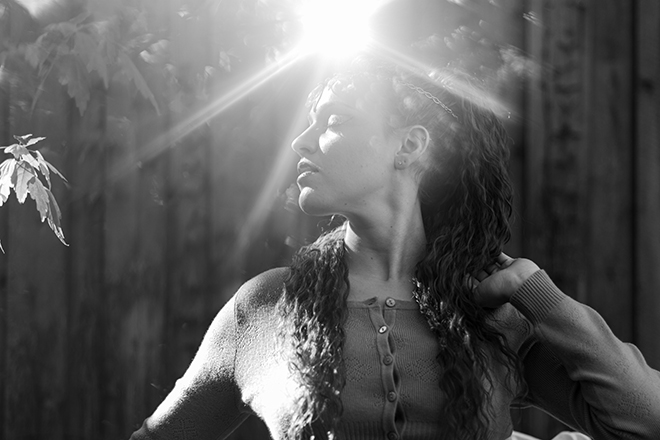
What’s the thing you miss the most about Dallas?
The trees on the side of the highway. The aesthetic of the architecture on your block. The way the breeze smells. The way the landscape is flat. The familiarity is what I miss. It’s no one special thing. I could leave and come back, and I recognize all this like the back of my hand.
Why L.A. instead of New York or Atlanta?
Ever since I was 10, I had this pact with my best friend, Sarah, that when we’re 19, we’re gonna get married and move to L.A. We were so silly. I did not know at 19 I’d be floundering around. I grew up listening to Destiny’s Child, Britney Spears and hearing pop. When I was 16, I got into jazz, and I totally just turned a page and started listening to straight-ahead jazz. Then I got into classics like Stevie Wonder, people who you can learn from. What was I talking about?
Why did you move to L.A.?
Oh, yeah, I just got a feeling.
How did you discover your style?
Life experience, finding out what I like and getting rid of all the voices telling me what I should do. But really, it’s about my roots from Dallas. I was just all over the map because I was listening to everybody. “Do musical theater!” “Maybe you should be an opera singer!” “Why don’t you sing straight-ahead jazz!” It takes a lot of strength to just say “no.”
Why didn’t you do classic musical theater or opera?
Because deep down, I’m just a control freak, and I need to be singing my own music.
What was the moment you came to that realization?
I think being onstage, doing someone else’s music, promoting their brand, making them get richer off a song that was written 10 years ago, 20 years ago. After two straight years of touring and not doing original music, I just got home, and I looked in the mirror, and I was like, “I’m gonna get burned out.” I changed my whole life and started doing my own stuff. I’ve never been more fulfilled in my life.
What themes do you try to incorporate into your writing?
Female empowerment, positive mindset and affirmation. Truth-seeking vulnerability. I used to be coming from a place of nostalgia in all my writing. This latest album, it’s all about empowerment. That’s the way to appreciate life. I found that through a whole process of going through such a dark place. All my songs were really sad and dark. Then suddenly, I was like, “Wait a minute, this will get me and everybody else nowhere.” I made a concerted effort to write so people could feel good.
What made that period for you so dark?
There’s so many ways a person can be lost. I think depression is a serious issue that needs to be less taboo. People have been talking about it, but it really is still taboo. People don’t take it seriously. They throw that word around. I think depression was what it was, and that can lead to like a string of other issues.
Why do you feel this is the moment in time to talk about empowerment?
More than ever in history, we have the power to make a change like never before now with social media and the current society. I realize how much has changed in the past 10 years. We have responsibility. We have to be accountable for that. It’s kind of scary. Artists have insane power to bring people together. It could make me cry. It’s crazy because we spend so much time in our head writing on our bedroom floor thinking: “Who cares?” But if you just keep going, then you see how it transforms into the full masterpiece. I hope that people walk away from my show feeling they can go home and say that thing to their partner that they couldn’t say before. They can call that person who didn’t pay them what they were owed. That is enough for me for right now.
How do you think artists can be more accountable?
Realize young people are listening, and take it seriously. If you realize you have the power to inspire action through your silly little song that’s not so silly after all, then maybe you’ll be more cognizant of what you preach.
What was the moment you realized how big of an impact that you can have on someone’s life?
I was touring with a group in Turkey. There was this little girl who came up to me after the show. This is pre-COVID. She ran up and hugged me, and I’m not famous. I’m not used to that. I looked down at her, and I was like: “This little girl is listening to this stuff.”
What’s next for you?
Pop stardom. On the plane to Texas, I wrote five songs. I know I just released an album, but I’m churning. I’m ready to go back in the studio. I’ve got a whole other studio album in me. It’s like ready to pop. I don’t know when, but it’s coming out.
What do you think about trained musicians versus YouTube stars?
I wouldn’t hate on anybody. I think art is art. There are pros and cons to both worlds. My thoughts are to each his own. There are so many people who’ve gone so far without training. And they’ve stayed true to themselves because of that. There are other people who needed that training to find the tools to say what they needed to say.
What is it like once you come off the road?
Oh, it’s always mixed emotions. So much nostalgia for what you just went through. Like this rebirth. Like, “What just happened?” And then it’s always a little bit tough to reacclimate to society.
What are your on-the-road necessities?
Caribou Coffee. Sour gummy bears every once in a while because you don’t need a lot of it. Got to stay healthy on the road. And you’ve got to eat right. Noise-canceling headphones. I love people, but then I have to recharge by myself.
What is advice you would give a young artist right out of school?
Don’t listen to them. Close your eyes. Take a deep breath. What do you want to sing? What do you want to say? What do you want to play? What do you want to do? What’s your biggest dream? This is your one life. Don’t waste it doing what everybody else thinks you should do.
This interview has been edited for clarity and brevity.


